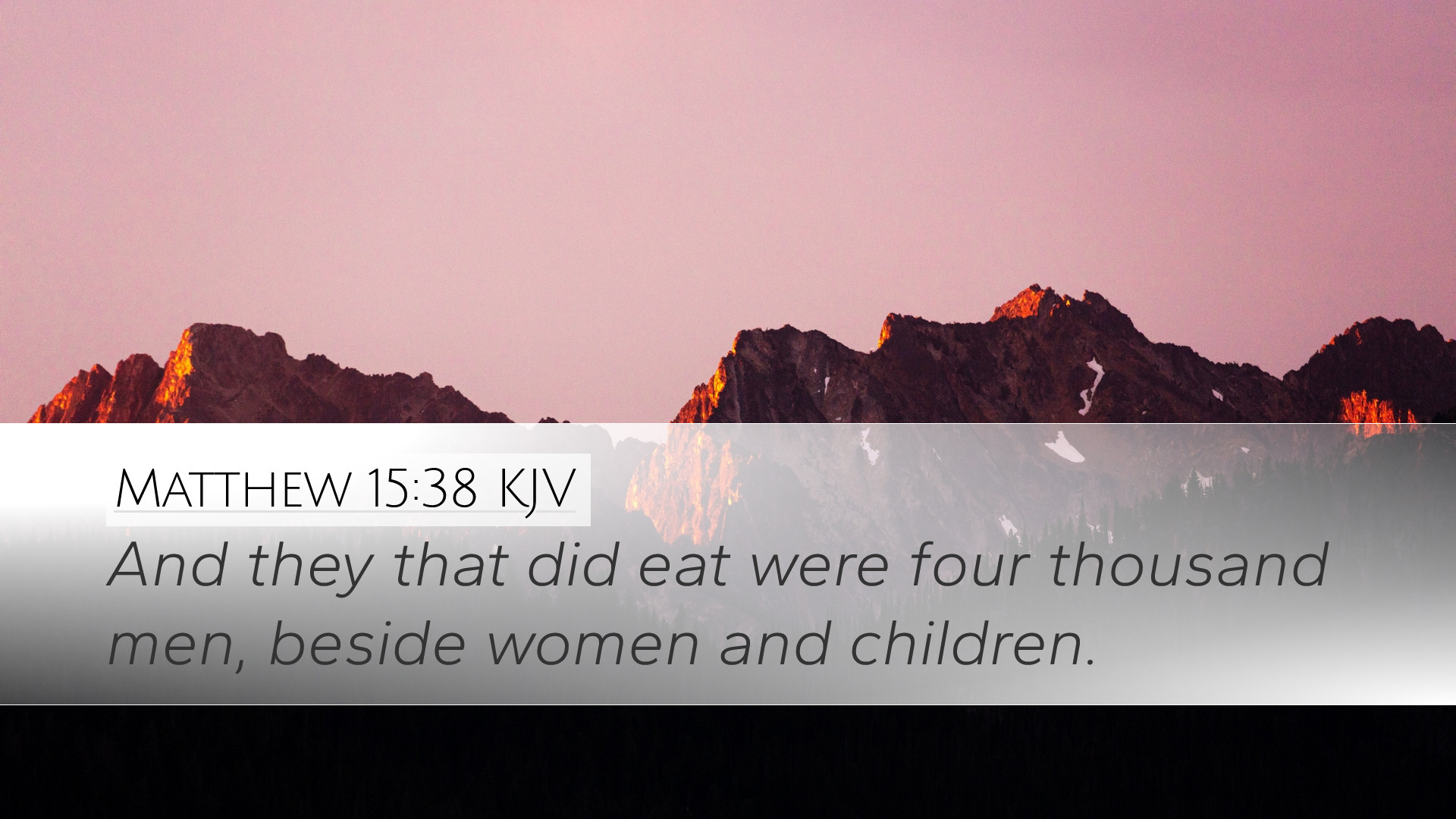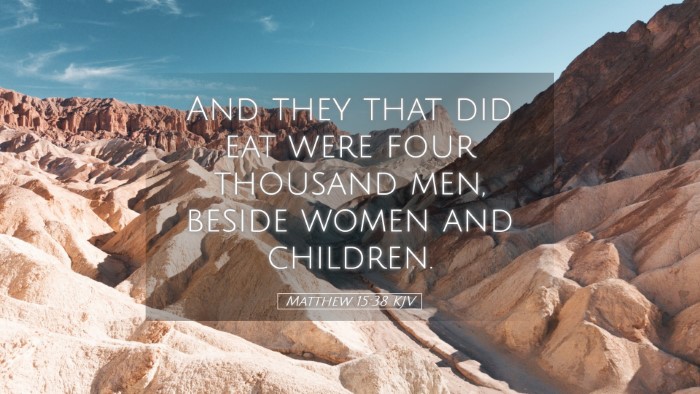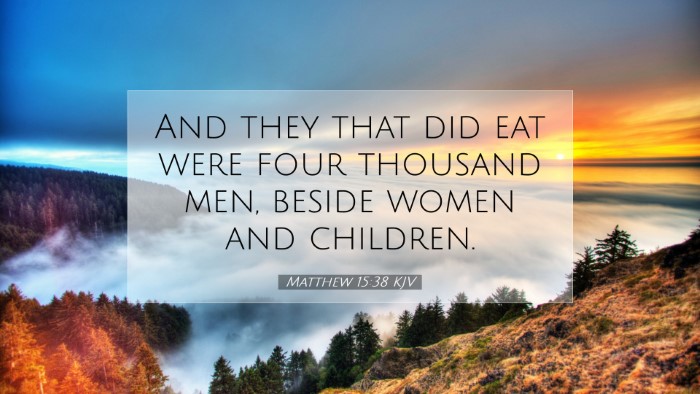Commentary on Matthew 15:38
Matthew 15:38 states: "Those who ate were four thousand men, besides women and children." This account of Jesus feeding the multitude highlights profound themes of compassion, provision, and divine abundance.
Contextual Overview
This passage occurs in the context of Jesus’ ministry among the Gentiles, specifically in the region of the Decapolis. This setting is significant as it underscores the universality of Christ's mission and His willingness to minister beyond Jewish confines.
Insights from Matthew Henry
Matthew Henry notes that the feeding of the four thousand is another instance of Christ's miraculous works, showcasing His compassion for the hungry multitude. Henry emphasizes the following points:
- Compassion and Care: Jesus saw the need of the crowd and was moved with compassion. He recognized that they were without food and had been following Him for three days (Matthew 15:32). This illustrates His concern for both their spiritual and physical well-being.
- Human Resourcefulness: Henry reflects on the disciples' response to Jesus' concern about feeding the multitude. Their question ("Where could we get enough bread in such a remote place to feed such a crowd?") signifies a moment of doubt. This represents a common struggle of faith when facing overwhelming circumstances.
- Jesus’ Miraculous Provision: The act of breaking the bread and distributing it among the people demonstrates Jesus’ divine authority. Henry asserts that this event teaches about God’s ability to supply needs abundantly, even in seemingly impossible situations.
Insights from Albert Barnes
Albert Barnes provides a complementary perspective, emphasizing the following key points:
- Sign of Divine Compassion: Barnes illustrates that the miracle serves as a direct reflection of Jesus’ character. His actions exemplify compassion not only for the spiritual but also physical needs of people. This mirrors the heart of God who cares for His creation.
- Numerical Significance: The reference to "four thousand men" highlights that this miracle was significant in scale. Barnes points out that Jesus continued to draw large crowds, emphasizing His role as a provider and leader of a burgeoning movement.
- Inclusiveness of the Kingdom: This feeding miracle is set against a backdrop of Jesus performing miracles among Gentiles, reinforcing the message that God's grace and provision extend beyond the boundaries of Israel. Barnes notes that this serves as a precursor to the Great Commission, where the Gospel is spread to all nations.
Insights from Adam Clarke
Adam Clarke offers detailed theological insights, particularly regarding the nature of the miracle and its implications:
- Divine Method of Provision: Clarke emphasizes that Jesus didn’t create food from nothing but used what was available (seven loaves and a few fish). This reflects the theological principle that God often uses ordinary means to achieve extraordinary results.
- Spiritual Implications: Clarke interprets this miracle as a symbol of spiritual nourishment, where Jesus represents the bread of life. The act of feeding the multitude points towards the ultimate sustenance found in Christ's teachings and presence.
- Call to Discipleship: The disciples' involvement in distributing the food highlights the importance of human agency in the spread of the Gospel. Clarke suggests that this serves as a reminder for believers today to actively partake in God's work of provision and evangelism.
Theological Themes
Combining insights from these commentators, we can draw several theological themes from Matthew 15:38:
- Divine Compassion: The feeding of the four thousand exemplifies Christ's profound care for humanity's needs, urging us to follow His example of compassion in our ministries.
- God's Abundance: This miracle signifies that God can provide abundantly beyond our expectations. It encourages faith even in challenging circumstances, reaffirming that divine provision is often realized in our trust and reliance on Him.
- The Inclusivity of Christ's Message: Understanding the context of the miracle offers a reminder that the Gospel is for all people, regardless of background or nationality. This points believers towards a more inclusive ministry.
- Partnership in Ministry: The disciples’ role in the distribution of food underlines the principle that God desires to work through us, calling each believer to participate actively in ministry, echoing the Great Commission.
Application for Today
As pastors, students, and scholars reflect on Matthew 15:38, there are several areas for deeper application:
- Modeling Compassion: In our communities, we are called to identify and meet the needs of those around us. Like Jesus, we must strive to be sensitive to the hunger—both physical and spiritual—present in our world.
- Trusting God’s Provision: In times of need, remembering the miracles of Jesus encourages believers to maintain faith that God can and will provide beyond human capability.
- Engaging in Inclusive Ministry: The Church should strive to break down barriers, ensuring that all people feel welcome and valued in God’s kingdom, reflecting Christ's love for all humanity.
- Activating Discipleship: Believers are called to participate in God’s work, whether through service or sharing the Gospel, reinforcing that each of us plays a vital role in God’s plan.


